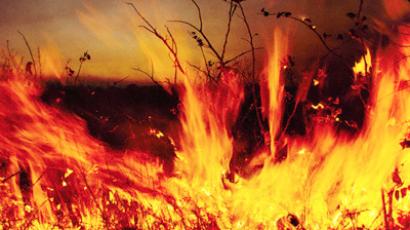Fears of 2010 wildfires returning to Moscow
As the mercury heads for 40 degrees Celsius in Moscow, memories of last summer's smoke-covered city loom large. The extreme heat-wave has already caused an outbreak of wildfires.
A whiff of a smoke – and Moscow is in panic again. The toxic cocktail of peat smoke, wood smoke and exhaust fumes that filled the capital last August is still vivid in people’s memories. Intense peat bog fires and the record heat-wave were blamed for the dense smog that sent pollution levels soaring tenfold and were thought to have contributed to tens of thousands of deaths in the capital. The authorities swore they would be prepared this year.In 2010, doctors said breathing in the smog that covered the city was equivalent to smoking a pack of cigarettes every hour. Now, the question on everyone’s mind is whether the miserable smog is back again.Peat bogs may look harmless, with just tiny flames on the surface, but in fact every square meter requires a tonne of water to extinguish the fire burning deep underground.“A tiny smoldering piece beneath the surface may undermine all our work,” says Grigory Kuksin, head of the fire information service at Greenpeace.The authorities insist the situation is under control and most of the fires in the Moscow Region have been successfully extinguished. However, campaigners say officials are under-reporting the extent of the problem, both around Moscow and across the country.“The situation is made even worse by the bureaucrats who, instead of reacting swiftly, spend all their time concealing the information about fires and thus making it more difficult to get to them in time,” Kuksin continued.Campaigners say part of the problem is that the forests are being mistreated. They say more needs to be done to prevent fires by better management. With summer at its peak, remnants of campfires are all across the forest, despite the ban introduced a month ago. And there is not much volunteers can do.The record-breaking heat of summer 2010 resulted in devastating forest fires that killed 62 people, destroyed 199 towns and reduced 3,200 houses to ashes.“The fire was literally coming towards us,” a villager tells RT. “We could hear the trees crackling as they were burning, and then whoosh – the wind blew it the other way.”This year, most of the country is again sweltering and the fires are raging once more. Large areas of forest have already been destroyed in Russia’s Far East, while parts of the north are already choking on smog. And with August still to come, Russians from the capital to the countryside hope the summer sun will not be as deadly this time.













